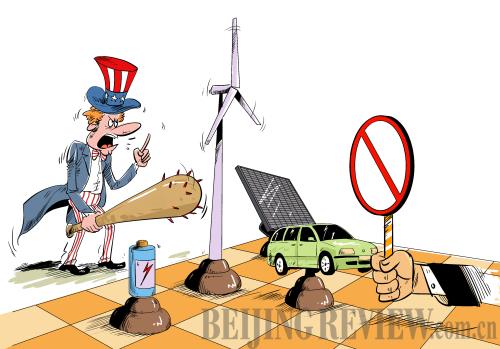|
 |
|
(CFP) |

As the sole superpower, the United States is the biggest beneficiary of current international rules. Taking advantage of its dominant status in the international system, Washington has recently adopted a new tactic when dealing with Beijing: It has bashed the country with "international rules," calling China a challenger and a violator of established rules.
When meeting with visiting Chinese Vice President Xi Jinping in February, U.S. leaders once again urged China to follow the U.S. version of international rules.
There are several reasons why the United States has intensified its China-bashing rhetoric. Since the outbreak of the global financial crisis, China has continued to develop swiftly while the United States is mired in financial and fiscal crises. China's catching up has caused a sense of anxiety in the United States. Also, in a U.S. election year, candidates from both parties tend to make China a scapegoat to court voters. They have attributed U.S. troubles to China's unfair competition and violation of international rules. For instance, Republican presidential hopeful Mitt Romney has repeatedly accused China of being a "currency manipulator."
International rules can be generally classified into four major categories: economic rules, political rules, security rules and environmental rules. International economic rules, together with international economic institutions such as the World Trade Organization (WTO) and the International Monetary Fund (IMF), regulate international trade, finance, investment and intellectual property. International political rules consist of diplomatic practices, public international law and norms of international relations, the core principle of which are respecting state sovereignty and non-interference in a nation's internal affairs. "Humanitarian intervention" and the "responsibility to protect," though highly advocated by Western powers in recent years, have yet to become universally accepted.
International security rules include rules on antiterrorism, non-proliferation of weapons of mass destruction, nuclear disarmament and arms control as well as codes of conduct on the high seas, the Internet and outer space. As for international environmental rules, these mainly refer to international conventions on climate change.
But many of the rules were adopted decades ago and have long become outdated. For instance, the informal rule that Western countries head the IMF and the World Bank is obsolete at a time when emerging economies gain prominence in world economic affairs.
China has always emphasized the important role that international rules have played in world affairs. It has also benefited from the current international system. As it integrates its own national interests with the overall interests of other developing countries and the international community at large, China sees both the advantages and the disadvantages of the current Western-dominated international rules. It is willing to follow reasonable rules. But it also seeks to reform unfair rules and establish new rules together with other members of the global community.
| 